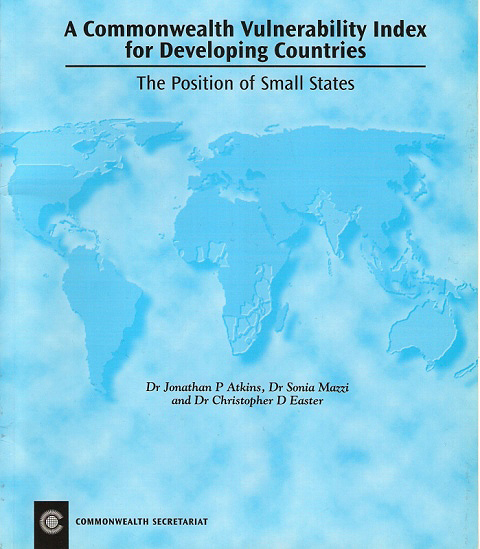 Commonwealth Vulnerability Index report published in 2000. [Commonwealth Secretariat]
Commonwealth Vulnerability Index report published in 2000. [Commonwealth Secretariat]
[This article from 25 years ago starts with the startling fact that of the 42 independent developing countries with populations below 1.5 million at that point, 29 were members of the Commonwealth. The author goes on to show how small states are peculiarly vulnerable to economic, environmental, political and social shocks, and therefore deserving of special and differential treatment in the areas of trade and finance. The author proposes a ‘Commonwealth Vulnerability Index’ as a measure of small states’ vulnerability. The article is currently free-to-access as part of our ‘From the Archives’ series.]
On the basis of recent population data, there are 42 independent developing countries with populations below 1.5 million. Of these countries, 29 are members of the Commonwealth. The incomes of small states exhibit a wide variability; they are among the poorest and wealthiest of all developing countries, according to reported levels of gross domestic product (GDP) per head. Similarly, GDP growth rates are little different for large and small countries. However, certain features that small states share render them more vulnerable, in general, than larger developing countries. By vulnerability is meant their exposure to economic, environmental, political and social shocks, over which they have little, if any, control, and their ability to resist or bounce back from the effects of such shocks, ie their resilience. Vulnerability is manifest in a significantly greater volatility of GDP growth rates in small states, compared with their larger counterparts. Three factors are highly significant in determining vulnerability; lack of diversification, trade dependence and the impact of natural disasters. Average GDP reflects resilience, suggesting that small states require a higher GDP in order to increase their ability to withstand external shocks without outside assistance.
It is as a direct result of their greater vulnerability that small states face distinct challenges in the changing world economy. Addressing these challenges requires appropriate country actions and strong domestic policies. However, the multilateral and bilateral development, finance and trade institutions also need to take explicit account of vulnerability in devising their policies and programmes towards small states.
Eye on the Commonwealth – columns exploring issues affecting Commonwealth countries
To date, a key criterion for adjudging the eligibility of small states for special and differential treatment in the areas of trade and finance has been income per head. It is argued here that it would be more appropriate to make such judgements on the basis of the flexible application of a broader set criteria which, in particular, reflects the extreme vulnerability of some small states. The Commonwealth Vulnerability Index (CVI), described in this paper, has been developed with the aim of providing such an objective indicator.



